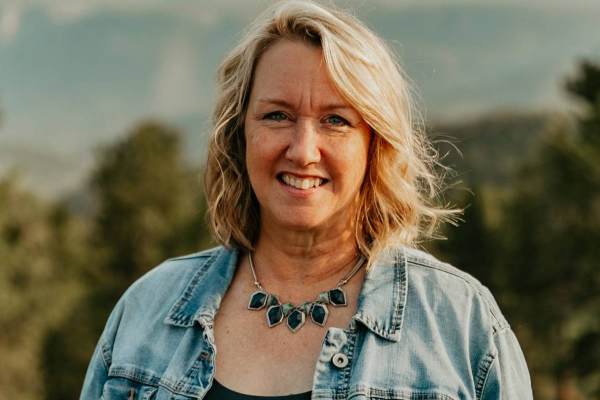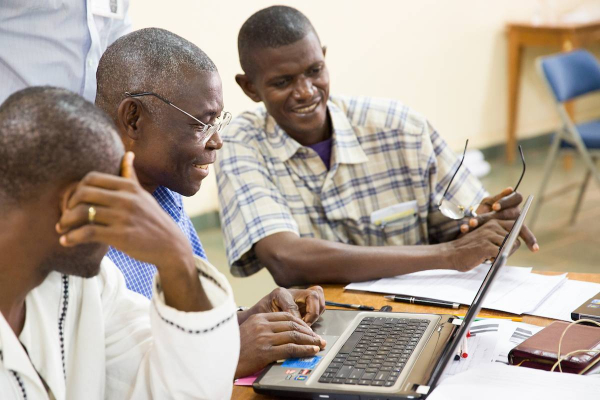7 Tips To Strengthen a Marriage in Missions

Whether you’ve been married for six months or 50 years, all marriages have their ups and downs. As you prepare to serve in missions, you might be wondering about the unique challenges missionary life will throw at your marriage. How can you strengthen and prepare your marriage for the challenge of missions? Wycliffe USA missionary DeAnna and her husband, David, have some tips to help.

DeAnna and David Anderson joined Wycliffe in 2008 and served overseas in Cameroon. There, they held a variety of roles including administration and children’s education. Now DeAnna is the director of the launch team for Wycliffe USA, where she helps guide and care for missionaries in their first years overseas. DeAnna shares seven tips for having a healthy marriage while navigating your first missionary years.
1. Agree You Are in It Together
Becoming missionaries is not just a job change; it’s a life change. And both spouses have to be completely on board.
“God calls a family; he doesn’t just call one individual out of a family,” DeAnna explained. “You both have to be on the same page: you are both called and you both are fully in it.”
This means missions can’t be just one spouse’s interest; both of you must be passionate about what God has called you to do. If one of you is not yet ready, then you should not move forward until you reach a wholehearted agreement together. DeAnna also recommended that while you and your spouse are on the field, you need to remain in sync. If one person is struggling and feels the need to return to their home country, then the other spouse should be attuned to that need and willing to take that step together.
2. Identify Conflict and Stress Patterns
Do you know how you and your spouse handle conflict and stress? Life on the mission field often involves unexpected situations, struggles and stressors. When we’re stressed, we often take out our emotions on the people we love most.

DeAnna asserted: “ It will take a toll on a marriage. … We especially see that during the cultural adjustment [period].”
Cultural adjustment can hit people at different times, so it's important to give each other grace. When DeAnna is working with new missionaries, she encourages them that this season of adjustment is temporary; they can choose to be grateful and show appreciation for what their spouse is doing. It’s easy to become wrapped up in how hard your own situation is and not understand your partner’s unique challenges. The key is that it is crucial to address the conflict and not just ignore it, because it will ultimately resurface later.
3. Decide on a Budget
Whether you’re the type of person who strictly adheres to a budget or you have more free-flowing tendencies, establishing and following a budget is a normal part of life as a Wycliffe missionary. If you and your spouse have never made a budget, it’s a great idea to start before you leave for an assignment! But even if you and your spouse are used to crafting budgets in the U.S., prepare for different types of budgeting challenges while overseas due to differences in necessities and wants, the cost and availability of items and more.
“[Budgeting while living overseas] is something that can add more stress when things are already stressful,” DeAnna said. To help with the adjustment, she encourages couples to start early and practice budgeting together even before they leave for their missionary assignment. (If you haven’t budgeted before, Dave Ramsey’s Financial Peace University is a great first step.)
4. Put Family First
“God has never called anyone to sacrifice their family or marriage for Bible translation,” DeAnna stated. “Find your boundaries, agree upon them together, stick to them and hold each other accountable [in the U.S.] and on the field.”

DeAnna recalled a situation that exemplified this: A husband was put in a challenging place at work when he was asked to do too many jobs, all of them critical to the Bible translation project’s success. As he attempted to accomplish all the tasks, he didn’t have enough bandwidth to respond when his wife and family were struggling. This put extra strain on their family.
DeAnna encourages couples to set healthy boundaries that will protect their family and allow them to serve long term. These boundaries include anything from establishing work hours and school schedules to interactions with coworkers and ministry goals.
5. Consider Kids
Whether you already have children or are contemplating having kids in the future, it’s important to discuss family dynamics before entering the mission field.

Some countries in the world are equipped to care for the needs of young children versus older ones. Certain countries have protocols for pregnancy and birth regarding cross-cultural workers. Educational needs and opportunities should also be evaluated before entering missions. What educational opportunities are available in the country you plan to serve in? How will these decisions impact your family? How will they impact you and your spouse as you serve?
Working through all these scenarios is a crucial step each couple must take before they leave for their assignment so they don’t have to navigate these difficult decisions and add stress down the road.
6. Talk About the Unexpected
No one enjoys having difficult conversations, but these are necessary to have between you and your spouse before you leave for your assignment. “It [was] hard to talk about, but before we left, my husband and I discussed what would happen if one of us died on the field,” DeAnna said.
What you expect or hope for regarding things like funerals, repatriation and more may not always be possible in certain countries. DeAnna watched several colleagues go through the unthinkable, so she gently counsels couples to consider their expectations and the reality of what would be possible regarding contingencies and policies.
She also suggests it is helpful for couples to think through how they can respond to major accidents ahead of time. “These kinds of things can also derail someone really quickly but if you think about [them] in advance and have plans loosely in place, it can help,” DeAnna suggested.
7. Nurture Friendship
In your home country, you are likely surrounded by friends or family. But when you uproot and move overseas, you’ll leave everyone behind except your spouse. Because of that, it’s critical that you and your spouse are friends.

“You really have to be friends as a couple,” DeAnna said. “Your family isn’t necessarily going to understand [what you are going through overseas], and your friends back home won’t understand. [Your spouse] is the only other person there walking through it who fully understands what is going on.”
DeAnna strongly recommends that you and your spouse regularly schedule date nights and stick to them. “Even if it’s just a date to talk together or budget together,” she said.
Even if they don’t look the same as dates in your home country, DeAnna has seen too many couples get caught up in the busyness of their first years on the mission field that they forget to connect with one another, and their marriage suffers.
Marriage on the mission field can be a time of great growth as a couple and it can also be a time of great stress. By incorporating these seven tips, you can work to care for and strengthen your marriage as you look forward to serving God, however he might be calling you.
What are other key skills that you need to develop before you go on the mission field? Check out our webinar for answers and more.






